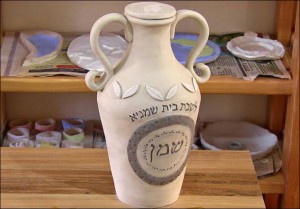The holiday of Hanukka is known as the festival of lights but in many respects it is also the festival of oil, specifically the olive oil used in Temple times to light the menorah, which we commemorate by lighting out hanukias, as well as feasting on festive treats such as doughnuts and latkes.
This year, the Temple Institute, an educational and activist group dedicated to preparing the vessels for the Third Temple, has produced pure olive oil fit for use in the Menorah of the Temple for what it says is the first time in two thousand years.
The production of four and a half liters of the precious olive oil this year was an extremely complex process due to the necessity of keeping it pure according to Jewish law. In addition, the ceramic flasks also had to made to conform to the standards of religious purity required for use in the Temple.
The newly pressed olive oil will feature in a festive procession through the Old City of Jerusalem on the seventh night of Hanukka on Monday night form the Zion Gate to the Temple Institute’s Visitors Center.
According to Rabbi Haim Richman, director of the Temple Institutes International Department, the production of the olive oil required precise knowledge of an extremely specialized and complex area of Jewish law.
Due to the exacting requirements of Jewish law for producing this pure oil, the research undertaken into these precise requirements was extensive and exhaustive, said the rabbi.
One requirement for the production process was that no fertilizer be used in the growing of the olives themselves, so the Institute needed to find olives grown organically.
One such organic olive grove was found in the town of Ramot in the Golan Heights.
There, earlier this month, Richman and others from the Institute harvested around 150kg of olives and pressed them under strict supervision and stringent conditions, such as the requirement that no metal come into contact with the olives, into four and a half liters of olive oil.
The olives were harvested and the oil pressed all on the same day.
The earthenware flasks made to contain the oil were produced by an artisan from the settlement of Ofra, again without the use of metal, and the oil stored inside them was sealed with a silicone plug which will maintain the oil’s pure status.
“Hannukka has a special strength and power, as the original light of the Temple, akin to the original light of creation, shines in Jewish homes during this holiday,” said Richman.
“The story of Hannukka is largely a struggle for the Jewish home, the Land of Israel, a and the Temple Mount,” he continued.
“The Greeks were trying to destroy both the Jewish homeland and the Jewish home itself, by issuing prohibitions on circumcision and special sanctified times like Shabbat and the Jewish holidays, which are an intrinsic part of Jewish family life.
“We see that the Jewish people are supposed to stand up and fight for what they believe in like the Maccabees.”

